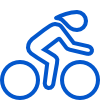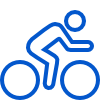
Dean Henry – Cycle Claim Case Study
Dean Henry was a 34 year old window manufacturer who was also a member of the Territorial Army. He was married with 2 daughters.
He was a keen cyclist and cycled to and from work each day.
Dean was cycling home from work when the defendant driving an uninsured car in the opposite direction turned right across his path resulting in a collision between the car and Dean’s bike.
Dean was thrown from his bike and landed on the road. Although he was not wearing a cycling helmet he suffered no external head injuries. However, he suffered a diffuse axonal brain injury which left him physically and mentally disabled. This type of injury occurs when there is a high speed injury to the brain with acceleration and deceleration. The long white matter track inside the brain are torn as the brain shifts inside the skull.
Dean was taken by ambulance to hospital where he was admitted to the Intensive Care Unit. He was ventilated and measures were taken to reduce the intracranial pressure. On 8th November 2001 he had a tracheotomy. He developed severe chest infections whilst in ICU and required oxygen, humidity and antibiotics. Ventilation was discontinued on 9th November and he was discharged to a Neurosurgical Ward on 10th November at which point he still had a tracheotomy but had no eye opening, no speech and was not obeying commands. He had severe increased tone in all four limbs with extensor spasms and no meaningful movement. He had surgery to introduce a percutaneous feeding tube. There were several complications with the tube including dislocation of the tubing, infections and post-operative haematoma.
He was transferred to the West Lane Neurological Rehabilitation Centre after 3 months at which point he was still unable to communicate or obey commands and had no voluntary movement and severe muscular spasms and contractures in all four limbs.
By approximately 6 months post-accident he was able to talk although he was still mildly confused. He had spontaneous eye opening and could obey commands by moving the fingers on his right hand but had no other voluntary movement in his limbs.
At 9 months Dean was having intensive rehabilitation including physio, occupational therapy and speech therapy. He was still in the Rehabilitation Unit but was able to go home for weekends. He required surgery to lengthen the tendons in both legs and in his left arm in order to alleviate the severe muscle spasms and contractures. At approximately 20 months after the accident he finally returned home to the care of his family.
Dean required a high level of care and assistance which was provided by his family and friends and professional carers were employed.
From the time he regained consciousness Dean was very aware of his disabilities and suffered from severe depression and low self-esteem. Prior to the accident Dean was very active and enjoyed a wide range of sporting activities including cycling, canoeing and golf. He and his family regularly enjoyed holidays abroad and he had an active social life.
Dean lived in a 3 bedroom mid-terraced house where they had lived for 10 years before the accident. He was a skilful DIY enthusiast and had undertaken extensive renovation and improvements to his house. Following his discharge from hospital, adaptations to the property were carried out to include an en-suite bathroom but the house remained unsuitable for his needs and following a substantial interim payment a new property was purchased.
The claim was dealt with by the Motor Insurers Bureau who deal with claims against uninsured and untraced drivers. The MIB did not contest the circumstances of the accident but causation and quantum were disputed.
Through our extensive knowledge and experience of dealing with this type of claim, we brought together a team of medical and non-medical experts to prepare reports in support of the claim. We instructed medical experts in neurosurgery, neurology, neurorehabilitation, neuropsycholology, orthopaedics, general surgery and ophthalmology. Expert reports were also obtained in relation to physiotherapy, speech therapy, occupational therapy, care and case management, aids and equipment, transport and accommodation.
We also instructed an experienced and highly regarded Queens Counsel who provided invaluable advice to Dean and his family and was an important member of the team.
Expert engineering and medical evidence was also obtained in relation to the important issue of whether a cycling helmet would have reduced the severity of Dean’s injuries. The experts were divided on this issue. Our experts were of the opinion that a helmet would not have made any difference as we were concerned with a diffuse axonal injury. However, the defendant’s experts argued that a helmet would have reduced the severity of the frontal lobe brain contusions and the severity of the diffuse brain injury. This issue was hotly contested but no concessions were made during negotiations and the claim was eventually settled on a full liability basis.
Although the circumstances of this accident were relatively straight forward the injuries were serious and the claim involved a number of complex issues. Through our experience we were able to gather the evidence necessary to bring the claim to a successful conclusion. It was necessary to work closely with Dean’s family and to identify and assemble the right experts and to instruct the right Counsel.
The MIB instructed numerous experts of their own both medical and non-medical and there were substantial areas of disagreement between the experts.
At a joint settlement meeting we were unable to agree settlement terms but after further negotiations the MIB increased their offer to the amount we were seeking and the claim settled in the sum of £2.35 million.

Cycle Compensation
Our specialist lawyers have recovered millions of pounds on behalf of injured claimants and will guide you through your cycle claim.

Cycle Repairs
Recovering the full cost of getting your bike repaired or replaced, so you can get back on the road as soon as possible.

Rehabilitation
To alleviate pain, help you return to work or get back on your bike. We will help you make the best recovery possible.
